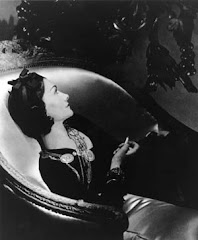 Would I tell you a lie?
Would I tell you a lie?I went last night to the launch of
George Szirtes' collected poems, a reading at the
Savile Club on Brook Street followed by dinner in the very grand chandelier-hung dining room.
At the reading George asserted that novelists were liars and poets told the truth.
He then read a marvellous poem called and about
esprit d'escalier, the French phrase for the brilliant rejoinder you only think about when you are going down the stairs leaving the conversation. In his poem he is on the top deck of a bus when he speaks aloud that I-wish-I'd-thought-of-that-at-the-time remark, and realises that the man sitting behind him is doing the same thing, and looking out of the window of the bus the whole street is full of people saying aloud what they wish they had said.
During the Q&A after the reading, I resigned myself to asking a question about the influence on his work of living in East Anglia for many years , and waited until dinner to refer to the remarkable event in which everyone on the street and on the bus was suddenly saying aloud their
esprit d'escalier which he could not have invented not being a lying novelist
. George had the good grace to burst out laughing. At this point we were joined, in a case of dinner musical chairs, by the poet
Ruth Fainlight, who is married to the novelist
Alan Sillitoe (happy 80th, Alan).
I have nothing at all against anyone saying that the novelist is a liar, since this is demonstrably true, but I could not quite understand how in the case of the poet, his imagination produces truth and in the case of the novelist, lies.
George maintained that the poet is solipsistic, always writing about himself and his attempt to understand why a cup is a cup and not, say, a saucer. When a novelist tells lies, he is asking the reader to willingly suspend his disbelief, to believe that the lies are true; he invents cups that aren't there. When the poet lies, the lie is obviously a metaphor, and is not to be taken for reality, it's a vehicle to say something else. The novelist, however, is trying to hoodwink you into believing that there is a cup, saucer, entire dinner service, real and actual.
But by this time we had eaten some very good duck with mashed potatoes and drunk a lot of wine and I went home. I hope George himself will be along in a minute to sort things out further.
UPDATE
and there he is in the comments, below and at greater and very interesting length,
at his place
























And on the subject of what a client of mine recently called with masterful understatement the "current challenging economic climate", it's up to each of us to decide how we respond. I see no reason why your rationale for making a particular purchase should not be decided by the same criteria that should always have applied: whether you can afford the item and whether you want it at that price. What does anyone else have to do with it?
You may consider that people are having trouble with meeting "basic needs", but there is a vast difference between what constitutes a "basic need" in the US and affluent West and that which might apply elsewhere in the world. Some people have never been able to meet their basic needs. Maybe I am thoroughly selfish, but I have never once considered not buying something because in India, there are children whose parents can't afford to allow them to attend school, or elsewhere people are starving. Why should it make any more of a difference that someone who never considered themselves poor before may now have difficulty buying petrol and instead may have to take the bus or suddenly can't afford a cellphone?
You could look at it the other way and say, buy the bag and take a cab home and at least you make sure that it is more likely that the sales assistant and the cabbie keep their jobs a while longer. Or not, as you please. Once you've paid your taxes, and made whatever donations to charities you consider appropriate (including perhaps those ones that supply food and/or schooling to those who can not afford it), whatever else you do is up to you. To me, a more relevant consideration is whether you get into debt because of how you spend such that you become a burden to others, than whether your spending offends someone who has less disposable income than you do since I don't really see why it's any of their business in the first place.
In the end, however and whatever you spend, a little more generosity of spirit and tolerance for each other's differences can not go amiss, don't you think?